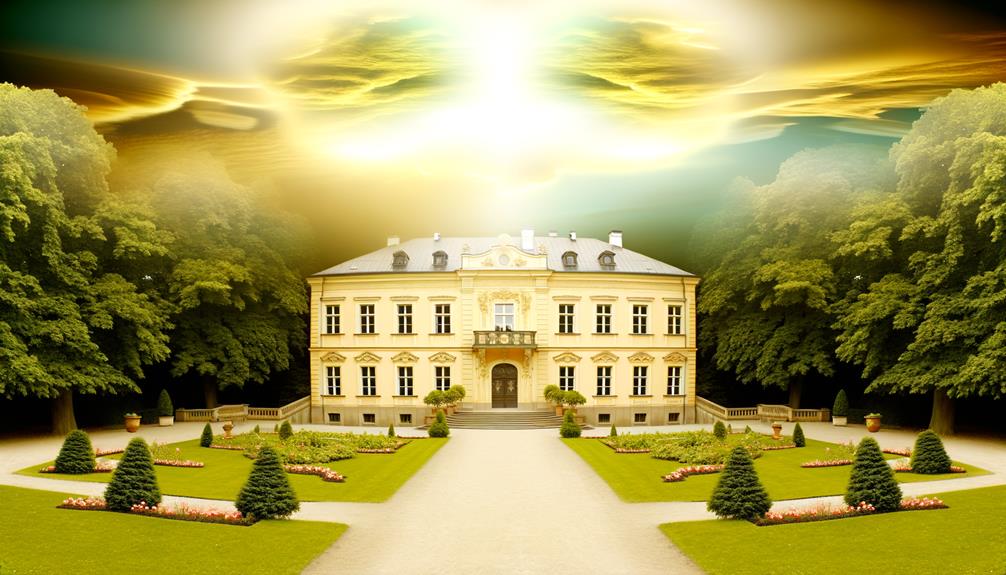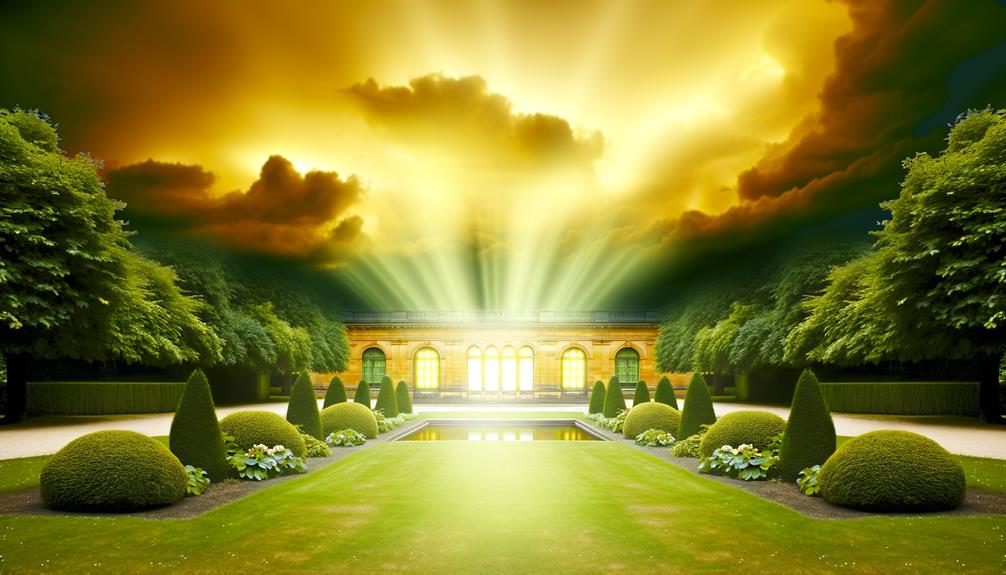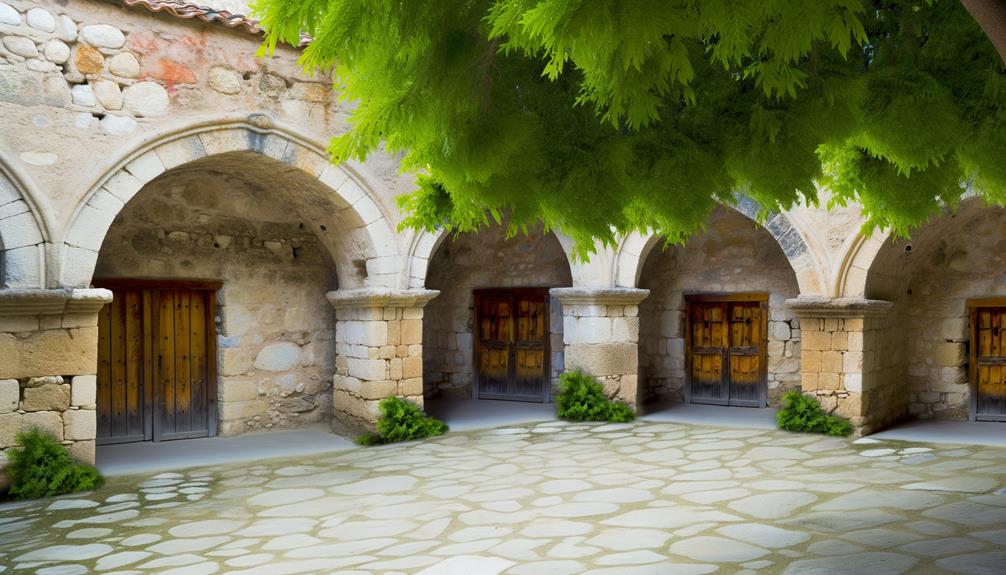Meaning of Mansion in the Bible: Heavenly Dwelling
In the Bible, the term ‘mansion‘ mainly originates from the Greek word ‘mone’ used in John 14:2, which translates to ‘dwelling place‘ or ‘abode.’ It signifies an eternal, permanent state of communion and fellowship with God. This metaphorical expression underscores the promise of divine hospitality and spiritual safety, reflecting the eschatological hope of eternal life.
The mansion in the Father’s house provides a profound assurance of abiding in God’s presence forever, offering comfort and peace. This promise carries rich theological implications, rooted in the fulfillment of divine promises and the reward for righteousness.
Understanding these dimensions reveals deeper insights into biblical eschatology.

Meaning of Mansion in the Bible: Symbolism of Eternal Dwelling and Hope
| Aspect | Description |
|---|---|
| Key Scripture | John 14:2 – “In my Father’s house are many mansions…” |
| Literal Meaning | A dwelling place or room; translated from the Greek word monē |
| Symbolic Meaning | Represents eternal life and a personal place in heaven |
| Spiritual Promise | Assurance from Jesus of a prepared place for believers |
| Translation Note | Modern versions use “rooms” or “dwelling places” instead of “mansions” |
| Faith Application | Encourages believers to live with hope and assurance in God’s promise |
Biblical Context of ‘Mansion’

In the biblical context, the term ‘mansion‘ often derives from the Greek word ‘mone,’ which appears in John 14:2, where Jesus promises His disciples that He is going to prepare a place for them in His Father’s house.
The word ‘mone’ is translated as ‘dwelling place‘ or ‘abode,’ suggesting a permanent, secure residence. This term conveys more than mere physical space; it denotes a spiritual state of being in communion with God.
The concept of ‘mone’ underscores the assurance of eternal security and divine fellowship. Theologically, it reflects the eschatological hope rooted in the promise of an everlasting home with God, allowing believers to anticipate a future marked by divine presence and eternal comfort.
Jesus’ Promise in John 14:2

Jesus’ promise in John 14:2 underscores the assurance of a prepared, eternal dwelling place for His followers, emphasizing the certainty of divine provision and eternal fellowship with God. In this passage, Jesus affirms, “In my Father’s house are many mansions: if it were not so, I would have told you. I go to prepare a place for you.” This promise reflects a profound theological truth, providing comfort and hope to believers anticipating eternal life.
The following table encapsulates key elements of John 14:2:
| Element | Description | Significance |
|---|---|---|
| Father’s House | God’s eternal dwelling place | Symbol of divine presence |
| Many Mansions | Abundant, prepared places for believers | Assurance of inclusion |
| Jesus’ Preparation | Personal involvement in preparation | Certainty of divine provision |
This assurance deeply resonates within the Christian faith, offering a vision of future communion with God.
The Father’s House

Envisioned as the ultimate dwelling place of the divine, the Father’s house represents the eternal abode where believers are promised a close, everlasting fellowship with God.
This concept is rooted in the teachings of Jesus, specifically in John 14:2, where He reassures His disciples of a prepared place within His Father’s house.
The imagery of the Father’s house conveys not just a physical location but a profound spiritual reality. It symbolizes a domain of divine intimacy and security, where the faithful will dwell in God’s presence.
Scholarly interpretations often emphasize this as a metaphor for the Kingdom of Heaven, underscoring the promise of eternal communion with the Creator, thereby offering comfort and hope to the Christian believer.
Symbolism of Divine Dwelling

The concept of a mansion in the Bible serves as a powerful metaphor for the Heavenly Abode, reflecting the ultimate fulfillment of divine promise and eternal communion with God.
This imagery of a spiritual shelter offers profound insights into the nature of divine hospitality and the assurances of spiritual safety and rest for believers.
Heavenly Abode Significance
In Christian theology, the concept of a heavenly abode often symbolizes the divine dwelling place prepared for the faithful, reflecting God’s eternal promise and ultimate communion with believers.
This notion is deeply rooted in scriptural references, such as John 14:2, where Jesus speaks of preparing a place in His Father’s house.
The imagery of a mansion, or many rooms, conveys not only physical space but also the depth of spiritual intimacy and eternal fellowship with the divine.
This heavenly residence signifies a culmination of faith and a reward for righteousness, embodying peace, security, and God’s unending love.
Consequently, the heavenly abode is more than a physical locale; it is an emblem of divine relationship and eternal life.
Spiritual Shelter Imagery
Through the rich tapestry of biblical literature, the imagery of a divine dwelling serves as a potent symbol of God’s protection, presence, and covenantal relationship with His people. This symbolism is woven into various scriptural passages, where the concept of a ‘mansion’ or ‘house’ reflects a spiritual refuge.
In John 14:2, Jesus speaks of preparing many ‘mansions’ in His Father’s house, illustrating an eternal abode for believers. This imagery extends beyond physical structures, encapsulating the divine assurance of spiritual safety and communion with God.
Such biblical metaphors underscore the belief in a personal, intimate relationship with the Divine, offering solace and a sense of belonging within God’s eternal kingdom. This spiritual shelter imagery reinforces faith and hope in divine providence.
Eternal Life and Comfort

The concept of eternal life and comfort in the Bible is profoundly encapsulated in the promise of a heavenly mansion, symbolizing the fulfillment of divine assurances.
Scriptural descriptions of this heavenly abode emphasize a domain of unparalleled peace and everlasting rest, offering believers a vision of their ultimate spiritual destination.
This promise underscores the core Christian tenet of life beyond temporal existence, providing comfort and hope to the faithful.
Divine Promise Fulfilled
Grounded in the promises of scripture, the concept of eternal life and comfort is intricately linked to the divine assurance of a heavenly dwelling, often symbolized as a mansion.
This imagery, deeply rooted in biblical texts such as John 14:2, reflects God’s covenant with His followers, promising them an eternal abode characterized by peace and divine presence.
The mansion metaphor underscores not only the permanence and grandiosity of this divine promise but also the profound sense of belonging and comfort it offers.
By fulfilling this promise, God provides believers with a tangible hope, reassuring them of a future beyond mortal existence, where eternal life is marked by spiritual fulfillment and divine communion.
This assurance anchors the faith of countless adherents.
Heavenly Abode Described
Scriptural descriptions of the heavenly abode elucidate a sphere of unparalleled peace, divine presence, and eternal comfort, embodying the ultimate fulfillment of God’s promises to His faithful. The Bible offers profound imagery and assurances of this celestial domain, emphasizing its transcendental nature and divine hospitality.
Key aspects include:
- Divine Fellowship: The faithful will dwell in the presence of God, enjoying an intimate relationship with the Creator.
- Eternal Comfort: Pain, suffering, and sorrow will be eradicated, replaced by everlasting joy and peace.
- Heavenly Mansions: Jesus promises many dwelling places in His Father’s house, symbolizing abundant provision and eternal security.
This elucidation reinforces the profound hope and assurance found in Christian eschatology.
Everlasting Peace Granted
As the celestial domain is depicted with radiant glory and divine fellowship, the promise of everlasting peace and eternal comfort further underscores the profound depth of God’s love and the ultimate fulfillment of His promises.
This eternal tranquility, often symbolized by the term ‘mansion’ in John 14:2, transcends earthly understanding and offers believers a vision of unending rest and divine communion.
The Scriptural assurance of eternal life provides solace and inspires hope, reflecting God’s unwavering commitment to His people.
Through faith and adherence to His teachings, believers are invited into a state of perpetual peace, free from worldly afflictions.
Such promises not only affirm God’s benevolence but also serve as powerful motivators for a life lived in spiritual devotion.
Mansions in Early Christianity

Early Christian interpretations of the term ‘mansion’ often reflected theological and eschatological themes, emphasizing the promise of eternal dwelling places in the afterlife. This notion was largely influenced by Jesus’ words in John 14:2, ‘In my Father’s house are many mansions.’
The early Church Fathers perceived these mansions as symbolic of the heavenly kingdom and the believers’ ultimate union with God. Key aspects include:
- Eschatological Hope: Assurance of a place in heaven.
- Theological Symbolism: Mansions representing spiritual domains.
- Community and Communion: Unity among believers in the afterlife.
This multi-faceted interpretation underlined the early Christians’ yearning for eternal communion with the Divine.
Interpretations Through the Ages

Throughout the centuries, interpretations of the concept of mansions in the Bible have evolved, reflecting changing theological, cultural, and philosophical contexts within the Christian tradition.
Early Church Fathers such as Origen viewed mansions as spiritual states of the soul, while Medieval theologians like Thomas Aquinas considered them literal heavenly abodes. The Reformation era saw a shift, with figures like Martin Luther emphasizing personal faith over material representations.
| Era | Theologian | Interpretation |
|---|---|---|
| Early Christianity | Origen | Spiritual states of the soul |
| Medieval Period | Thomas Aquinas | Literal heavenly abodes |
| Reformation | Martin Luther | Emphasis on personal faith |
| Modern Period | Various | Diverse perspectives, including symbolic views |
These interpretations underscore the dynamic nature of biblical exegesis, shaped by the prevailing intellectual climate.
Modern-Day Reflections

In contemporary theology, reflections on the concept of mansions in the Bible reveal a diverse spectrum of interpretations that incorporate both symbolic and literal understandings. Modern scholars and theologians often explore the term ‘mansion’ within the context of spiritual and eschatological promises, offering nuanced perspectives that enhance biblical comprehension.
- Symbolism: Some interpretations view mansions as symbolic of divine presence and eternal communion with God.
- Eschatology: Others consider mansions as literal, physical dwellings in the afterlife, aligning with eschatological hopes of heaven.
- Spiritual Formation: The concept is also employed to signify the stages of spiritual growth and sanctification.
- Cultural Relevance: Contemporary reflections adapt the metaphor to relate to modern believers’ lives, emphasizing hope and eternal rest.
These interpretations collectively enrich faith-based understanding.
Conclusion
In the biblical context, ‘mansion’ transcends its earthly connotations, symbolizing the boundless and eternal dwelling promised by Jesus in John 14:2 within the Father’s house.
This divine abode offers unparalleled comfort and eternal life, reflecting profound theological and eschatological significance.
Throughout history, interpretations of ‘mansion’ have evolved, yet the promise of divine dwelling remains a cornerstone of Christian faith.
The concept of ‘mansion’ consequently represents the ultimate, heavenly refuge, a divine shelter surpassing all human comprehension.






